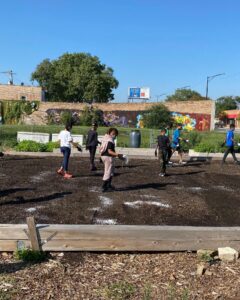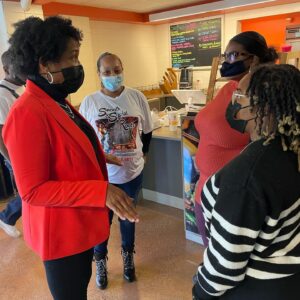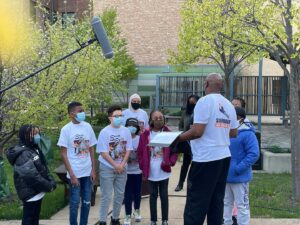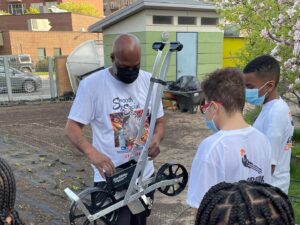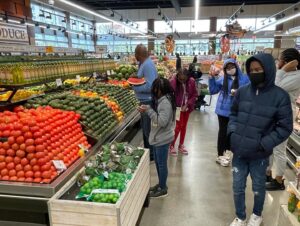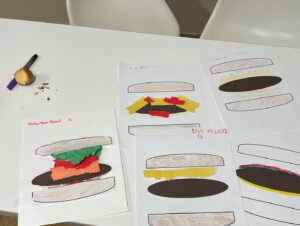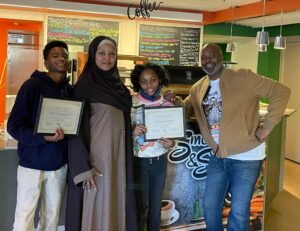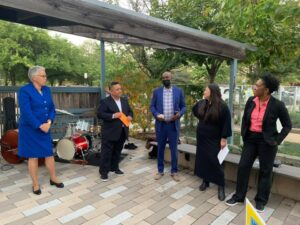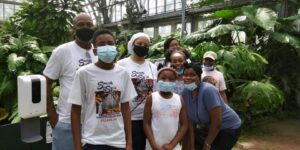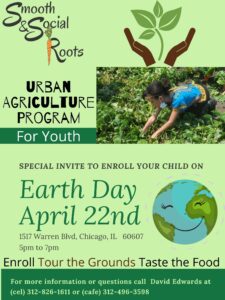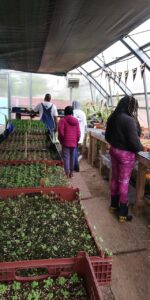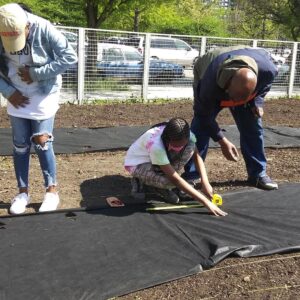Final report for FNC21-1269
Project Information
Smooth and Social Roots is a Farm to Table cafe' located in Chicago, IL. We grow fruits and vegetables such as watermelon, cucumbers, kale, collards, spinach, carrots, beets, radishes, and tomatoes. We use the food grown on the farm to cook the meals in the café. The café also holds a classroom for the Smooth and Social Roots Youth Urban Agriculture Program, for which SARE has provided funding. The Owner / Farmer, David Edwards opened the café January 2021. Before that, he ran a CSA program out of a shared farm owned by Windy City Harvest. He rented farm space, grew fresh fruits and vegetables and made weekly deliveries to his members.
Smooth and Social Root’s Youth Urban Agriculture Education Program is a pilot out-of-school time for children in an underserved community in Chicago. We will foster, in the youth, an appreciation for growing their own food. We want children to see farming as an option for self-sufficiency in historical food deserts, a healthy lifestyle choice in an obese nation, as well as a viable career path. The program will be implemented on our urban farm in Chicago. We also own a cafe near the farm. The cafe will utilize the food harvested on the farm to provide meals to its patrons. This will allow the children to experience the entire farm-to-table process. The program will last for 20 weeks. The children served for this pilot program will range in age between 8 and 14 (3rd through 8th grade). We will establish an inclusive environment for children of varying abilities.
The curriculum will be divided into two main ideas: Farming & Production. The curriculum will align to the Illinois State Standards in Science, Social Science, Career Pathways, and Social Emotional Learning. The children attend field trips and engage the community in events like Movies on the Farm or Yoga on the Farm.
Children will be able to
- Consider farming as a career path.
- Increase their knowledge in agriculture skills, business skills and overall environmental stewardship.
- Demonstrate their knowledge of the farm-to-table process.
- Articulate the importance having access to fresh food in an urban environment.
- Understand where food comes from.
- Become familiar with a variety of different foods, healthy meal preparation and healthy lifestyle choices
Research
Smooth and Social Root’s Youth Urban Agriculture Program Overview:
- Duration: 20 Weeks
- Dates: March 13th - July 31st
- Cohort: 9 Children
- Ages: 3rd – 8th grade (age 8-14)
- Location: 1517 W. Warren, Chicago, IL 60607 + 2913 W. Madison, Chicago, IL 60612
- Time: Saturdays only (during school year), Saturdays + one week-day (during summer), 3 hrs per session on Saturdays, and 1 hr on week-days
Logic: We chose Saturdays because the students will be in school when the program begins and we did not want the children to be overwhelmed throughout the week. We are beginning in March to coincide with the Spring planting season. We also wanted children to experience the farm while out of school as well so that they can focus.
Curriculum Overview:
- The curriculum will be divided into two main ideas: FARMING and PRODUCTION.
- The goal of this curriculum is to develop the sustainable person that will further promote the mission of Smooth and Social roots in his or her family and community.
- Majority of lessons will be tied directly to Illinois State Standards in Science, Social Science and Career Pathways.
- Lessons will promote cognitive, social emotional, physical development and life skills.
- Lessons will be integrative of other subject areas such as ELA (English Language Arts), Math, Art, Health & Nutrition, and Physical Education.
- The daily lesson plan will include several lessons covering several concepts.
- There will be some experiences that will happen every day the students attend: taste testing and/or cooking experience, time observing and documenting, time farming, time reflecting
- The children will attend at least 3 fieldtrips.
- The Curriculum will be provided by Scarborough & Associates, LLC
Logic: We want to align the curriculum to state standards to increase the likelihood of partnering with local schools and having additional redeemable value for the student.
Our student participants took a pre test entering the program and a post test exiting the program. The assessment was constructed to measure the following areas:
- Consider farming as a career path
- Increase knowledge in agriculture skills, business skills and overall environmental stewardship
- Demonstrate knowledge of the farm-to-table process
- Articulate the importance of having access to fresh food in an urban environment
- Understand where food comes from
- Become familiar with a variety of different foods, healthy meal preparation and healthy lifestyle choices
The overall score from both the pre and post test were exactly the same 71%. We know that the students gained knowledge and skill related to the areas assessed. However, what we think happened is that we did not use the same language with the children in our day to day interactions with them, as we did in the pre and post assessments. Therefore, some ideas may have got lost in translation.
Educational & Outreach Activities
Participation Summary:
Smooth and Social Roots had 5 consistent youth participants in our Youth Urban Agriculture Education Pilot Program. In most cases the parents stayed with the students learning along and experiencing the farm activities as well. Therefore, our average daily participation was 10.
Smooth and Social Roots primarily advertised our events and kept the community informed via Facebook and Instagram. I have included a flier from our initial opening event which took place on Earth day. I have also included photos and fliers from our fieldtrips to the Garfield Park Conservatory and a grocery store, a Farmers Market Event we hosted, a Jack & Jill Fieldtrip we hosted and visits from county and state officials. Among the officials that visited the café are Lieutenant Governor of Illinois Julianna Stratton and Cook County Board President Tony Preckwinkle.
Expanding Innovation in Early Education (the Education Extension FB Page), Smooth and Social Roots (The Farm / Cafe'sFB Page)
Learning Outcomes
Having an education person coupled with the Farmer was an excellent paring. With the two expertise joined together, we were able to cover the content itself and communicate it in a way that the students were able to retain the information. We also learned that any program involving youth has to be, not only motivating for the children, but the parent as well. The children rely on the parent to take them to and from the program, therefore the parent must also be invested and see the value.
The presence of the youth agriculture program definitely increased the communities' awareness of the café. It also increased support of the café because the larger community was able to see that the owner David Edwards is not just trying to make money but has a vested interest in providing resources to the community at large
4 out of 5 of our participants were girls. This is interesting because according to the USDA's 2017 Census of Agriculture, women are only 36% of the total population of US farmers. This may be an indication that there is a growing interest among girls to become famers.
We also did a pre test to determine what the students already know about farming. The results of the test let us know that there is a great need for programing such as this because the students lacked basic knowledge of the following:
- farming as a career path
- agriculture skills, business skills and overall environmental stewardship
- the farm to table process
- the importance of having access to fresh food in an urban environment
- where food comes from
- a variety of different foods, healthy meal preparation and healthy lifestyle choices
